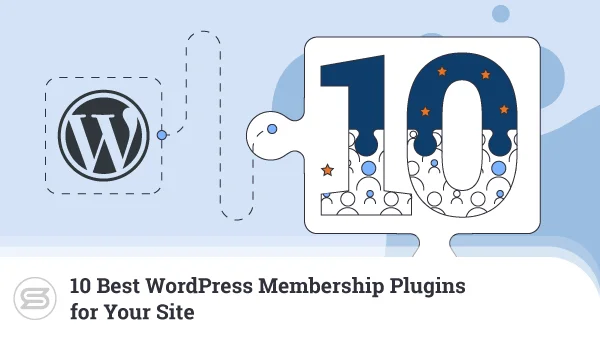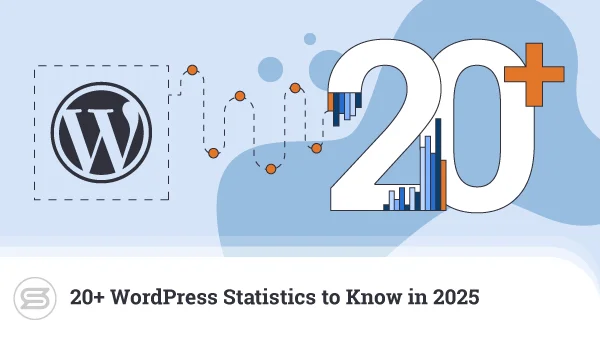Behind The Scenes – How Does WordPress Work?
WordPress is the world’s most popular open-source Content Management System (CMS). What began as a simple blog engine in 2003 evolved into a complete web development solution on the basis of an extensible design system. Web publishers can extend the core features of the WordPress CMS with various add-ons and widgets to build the functionality they need.
In today’s guide, we will be looking behind the WordPress curtains and learning more about the ins-and-outs of the popular site-building platform.
What is WordPress?

WordPress was launched by Matt Mullenweg and Mike Little in 2003 as a fork of the blog engine B2. The script is written in PHP and is installed on a MySQL database, outputting web content in pages written in HTML, CSS, and JavaScript. Developers can install plugins and themes from third-party PHP developers that are available for free or under a paid subscription license.
The core WordPress functionality operates as a multi-user blog platform. Solutions like WooCommerce from Automattic add the plugins required to manage a complete ecommerce store. The BuddyPress distribution allows WordPress to operate as a social network, while the bbPress package can be used for forum sites.
Overall, there are thousands of independent development solutions for WordPress that can be used to build almost any type of website.
Why Should you Learn WordPress?

WordPress powers over 40% of all websites published online and supports an ecosystem of millions of professional developers. Business publishers of all sizes rely on the script for its ease of use, open-source licensing, vast archives of free code resources, and peer-reviewed security. The world’s largest brands, media publications, and NGOs use WordPress because of its ability to scale and meet the highest rates of user traffic levels at a low cost.
Learning WordPress gives developers a consistent client base for custom theme design, PHP programming, JavaScript coding, and offering professional web publishing solutions. A significant time and organizational resources were put into WordPress’ web server optimization and runtime support operations.
On top of it all, WP allows businesses and startup organizations to build websites and mobile apps on open-source tools, thus saving significant investments in software development.
How Does WordPress Work?
WordPress can run on Linux, Windows, or BSD servers. Still, because of its main requirements of a PHP runtime environment and MySQL-compatible database, the app works best in a Linux environment.
You can also run the script on alternative server frameworks like Nginx, LiteSpeed, IIS, or Caddy, but many of the CMS settings require Apache’s .htaccess file to operate.
Most users can install WordPress with a single click using Softaculous or an alternative software auto-installer.
WordPress Core
WordPress core is the complete set of files released by Automattic in an official distribution. Its current version is 5.9.2, available as of March 2022. Each major WP platform release includes new features and functionalities as well as support for the latest programming standards.
According to “The Hook Routine: Hooks, Hook Functions and Callback Functions” (2022):
- “Actions are used to run custom functions at a specific point during the execution of WordPress Core. Actions are defined/created by the function: ‘do_action( ‘action_name’ )’ in the WordPress code.”
- “Filters are used to modify or customize data used by other functions. Filters are defined/created by the function: ‘apply_filters( ‘filter_name’, ‘value_to_be_filtered’ )’ in the WordPress code.”
The WordPress core includes all of the PHP code required for administrative use of the script for content management with registered users. The core is extended through various add-ons and widgets, which can be installed in the admin section by the site owner.
WordPress Hooks
Hooks are PHP code snippets in WordPress that allow plugins to interact with core functionalities or work together through information exchange. There are hundreds of pre-defined hooks for WP that allow developers to insert new code at specific points in the CMS runtime.
“Actions allow you to add data or change how WordPress operates. Actions will run at a specific point in the execution of WordPress Core, plugins, and themes.” – WordPress (2022)
The main difference between actions and filters is that the former use hooks to apply code to the WordPress runtime without returning any further data. In contrast, filters apply hooks with variable information that is then utilized in different plugins or analytics.
“Filters give you the ability to change data during the execution of WordPress Core, plugins, and themes. Callback functions for Filters will accept a variable, modify it, and return it.” – WordPress (2022)
Hooks allow PHP developers to add new features and functionality to WordPress in an integrated manner. How you position your PHP code in WordPress within your themes, plugins, or site pages will determine the results displayed in the CMS.
WordPress Functions
If you need to add custom PHP code to a WordPress website but don’t want the full functionality of a plugin, the functions.php file in the CMS core will allow you to add snippets that produce the desired results. The functions.php file allows you to consolidate all your custom code in one location to make simple development modifications to a WordPress website viable.
“The files of WordPress define many useful PHP functions. Some of the functions, known as Template Tags, are defined especially for use in WordPress Themes. There are also some functions related to actions and filters (the Plugin API), which are therefore used primarily for developing Plugins.” – WordPress Codex (2022)
Another useful option of the functions.php file is to develop a site-specific plugin. This allows your code to be compartmentalized and run through the WordPress core PHP processing sequence with reduced risk for errors. However, the cost of custom WordPress plugin development can be much higher than using snippets.
WordPress Classes
WordPress classes are used to implement object-oriented programming methods across core, plugin, and theme functions. Once a class is declared globally in WordPress, it can be referenced by other plugins and themes via hooks and functions to display in modular design.
“Class names should use capitalized words separated by underscores. Class file names should be based on the class name with class- prepended and the underscores in the class name replaced with hyphens, for example: ‘WP_Error’ becomes: ‘class-wp-error.php’. This file-naming standard is for all current and new files with classes.” – Naming Conventions (2022)
One of the keys to WordPress development is that when a class is created, it becomes an object dependent on a variable definition of properties. WordPress hooks can be implemented through custom code that draws information from the functions defined by the class itself.
WordPress Methods
In order for the information processed in WordPress classes to be available as calls through hooks to other plugins, the function must be publicly declared. This establishes the variable range of output in reference to a function or a method that can be applied through other code.
“There are a number of callable formats that can be used to reference methods on classes and objects. In all cases however, the referenced method must be publicly visible. A method is public when it is either prefixed with the public keyword, or no visibility keyword at all (in which case the method defaults to public).” – Hooking Class & Object Methods to Actions (2022)
The WordPress Plugin API includes a callback function that can be registered with any custom hook defined by a class. After the hook is registered with the CMS settings, any object can implement a callback by running the hook code. This allows professional PHP developers to add new features to WordPress that build upon the functionality of other plugins and themes.
WordPress Documentation
Hooks are used with custom WordPress code to implement callback functions that transfer data between plugin, widget, and theme elements. The WordPress Plugin API keeps a registry of all listed functions, along with a hierarchy of runtime weights that determines the processing order.
“Using a function to handle hooks is necessary when not using classes, but is also great for an object-oriented design approach. The callback function is used just to handle translating from one specific context to the proper dependency the class needs. This allows the class to act as a system for updating post meta based on categories, in any context and the function to be the connector to the plugins API.” – Torque: WordPress Hooks (2017)
WordPress theme, plugin, and widget design is a complex process governed by the standards of the core distribution. The Developer Resources archive at WordPress.org is the best place to get started learning professional programming methods. The archive includes code references, web standards, APIs, a block editor, and model resources for WordPress CMS development.
WordPress and VPS Hosting

WordPress installs on any web server hardware with PHP programming language support and a MySQL-compatible database. Professional development teams building plugins and themes for the WordPress CMS are recommended to adopt VPS hosting as it provides the most suitable environment for in-depth customizations.
Virtual private servers can also be used effectively when building software development pipelines for websites and mobile applications across distributed teams. A staging, testing, linting, and production environment can be installed on VPS servers using subdomains.
Programmers from Agile development teams can test custom plugins, themes, and platform upgrades before pushing changes live to production. The system is orchestrated with Git version control.


Conclusion
The WordPress ecosystem includes millions of professional PHP, HTML, CSS, and JavaScript developers building open-source plugins and themes for worldwide usage. There are thousands of blogs, courses, videos, and tutorials dedicated to teaching the main principles of WP development to beginners. In contrast, programming custom plugins and themes can take years of commitment to learn.
WordPress core, plugin, widget, and theme development all involve different standards that have been established over the last 20 years in the open source community.
Feel free to take a look at the WordPress Developer Handbook and The Official WordPress Code Reference for more information. You can find specific resources about WordPress core classes in the Codex.
Alternatively, our Technical Support Team are all trained with the most popular CMS and will be glad to lend you a helping hand.
FAQ
Q: What are the most important files and folders in the WordPress core?
A: The four most important reference files and folders in WordPress core are wp-config.php, wp-admin/admin.php, /wp-includes, and /wp-content/.
The wp-config and wp-admin files include your database, localhost, admin user name, and password. They also determine which plugins and themes are running with the core distribution.
The wp-includes and wp-content file contain your stored media resources and other system files. Users should avoid making any code changes to these resources on WordPress sites.
Q: Is WordPress good for beginners?
A: WordPress is absolutely your go-to choice if you’ve got no previous experience building a website. The application is quite user-friendly and most menus and options are self-explanatory. In addition to the low learning curve, there are tons of helpful additional materials like tutorials, step-by-step guides, videos, and community forums.
Q: Is there a monthly fee for WordPress?
A: The WordPress CMS is an open-source system, which means that you can use and modify it absolutely free of charge. Still, in order to see your website online, you would also need a reliable hosting provider and spare at least $3-$4/mo for the service.
As part of your plan, most hosts will offer tools for one-click WordPress installation and can configure the app for you.



